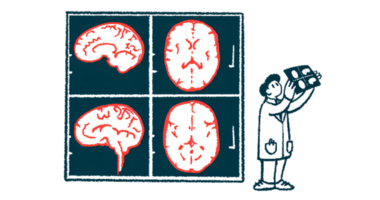Fenebrutinib significantly reduced brain lesions in relapsing MS: Trial
Therapy is a BTK enzyme inhibitor, working against B-cells and microglia

Genentech‘s investigational BTK inhibitor fenebrutinib significantly reduced the number of new brain lesions and showed no new safety concerns in people with relapsing forms of multiple sclerosis (MS).
That’s according to new data from the company’s Phase 2 FENopta clinical trial (NCT05119569), which is evaluating fenebrutinib’s safety, effectiveness, and pharmacokinetics (how a medication moves throughout the body) in 109 MS adults, ages 18-55.
“I am encouraged by this clinical data for fenebrutinib, which is important news for people living with MS,” Levi Garraway, MD, PhD, chief medical officer and head of global product development at Genentech, said in a company press release.
Fenebrutinib is an investigational oral inhibitor of the Bruton’s tyrosine kinase (BTK) enzyme, which is essential for the inflammatory activity of B-cells and microglia — two immune cell types that contribute to inflammation in relapsing and progressive forms of MS.
A number of other BTK inhibitors are in development, including Novartis’ remibrutinib, Merck KGaA’s evobrutinib, and Sanofi’s tolebrutinib. Fenebrutinib is uniquely designed to bind its target in a reversible manner, making it safer than other therapies of the same class, however. It also seems to have fewer off-targets than the other therapies and is 130 times more selective against BTK than against similar enzymes.
“Fenebrutinib’s mechanism of action, which can inhibit both B cells and microglia, has the potential to both reduce MS disease activity, such as relapses, and also impact disease progression,” Garraway said.
Clinical trials of fenebrutinib
The ongoing FENopta trial is investigating fenebrutinib in adults whose symptoms started less than 10 years before enrolling. Participants were randomly assigned to 200 mg fenebrutinib or a placebo (two 100 mg tablets, twice a day) for up to 12 weeks, or about three months.
The trial’s main goal — to determine if fenebrutinib is more effective than a placebo at preventing the formation of new brain lesions with active inflammation after 12 weeks — was met, as were several secondary measures. The treatment significantly reduced the number of new or enlarging brain lesions and increased the proportion of patients who didn’t develop any new inflammatory lesion or any new or enlarging brain lesion.
The therapy’s safety profile was similar to that seen in other clinical trials of more than 2,400 participants, without any new safety concerns. Detailed results will be shared in an upcoming medical meeting.
Meanwhile, fenebrutinib is being investigated in a large Phase 3 program that includes two identical trials in relapsing MS patients — FENhance 1 (NCT04586010) and FENhance 2 (NCT04586023) — and one trial in primary progressing MS – FENtrepid (NCT04544449).
The two FENhance trials are collectively enrolling about 1,500 adults with relapsing-remitting MS (RRMS) or active secondary progressive MS (SPMS) at hundreds of locations worldwide. Participants will be randomly assigned to twice-daily fenebrutinib or Aubagio (teriflunomide), an approved oral therapy for relapsing MS.
FENtrepid is investigating fenebrutinib against Ocrevus (ocrelizumab), the only approved medication for primary progressive disease, in 946 adults. Participants are still being enrolled at several sites and treatment will last for about 2.5 years.







